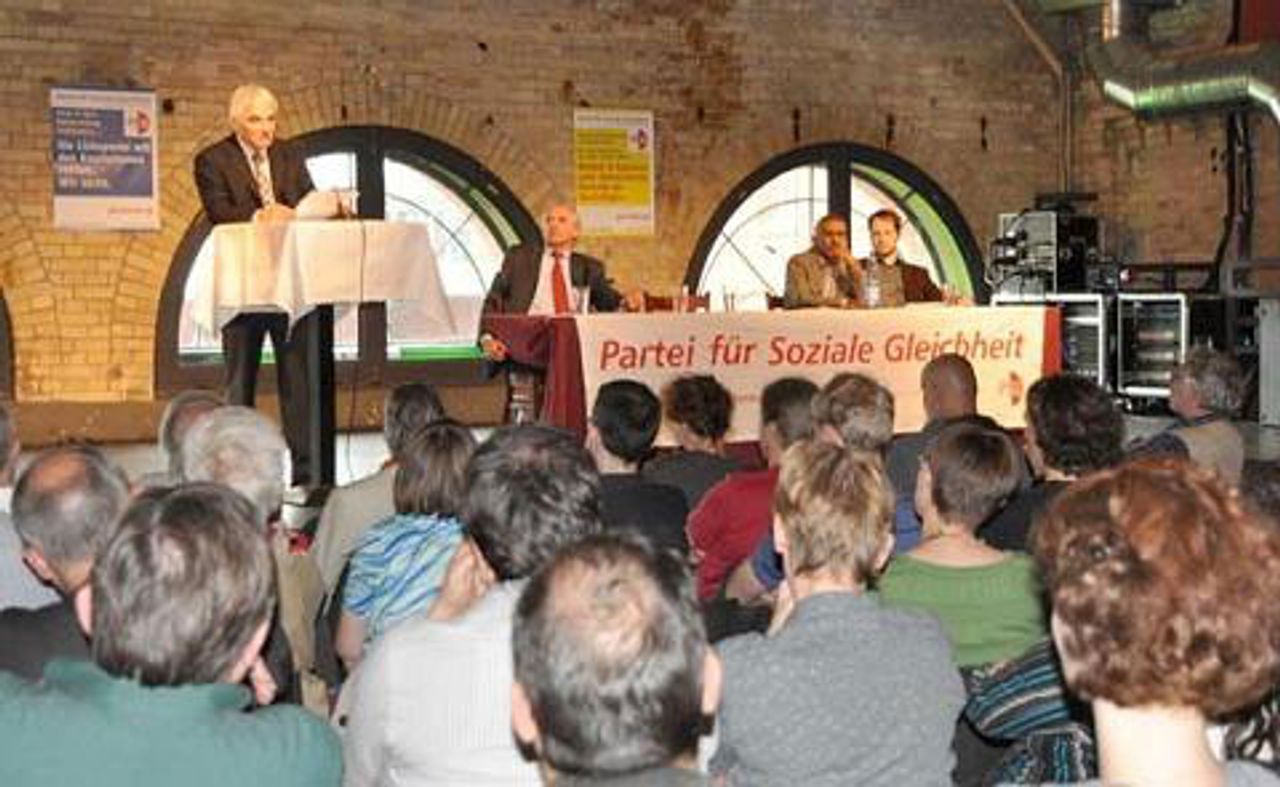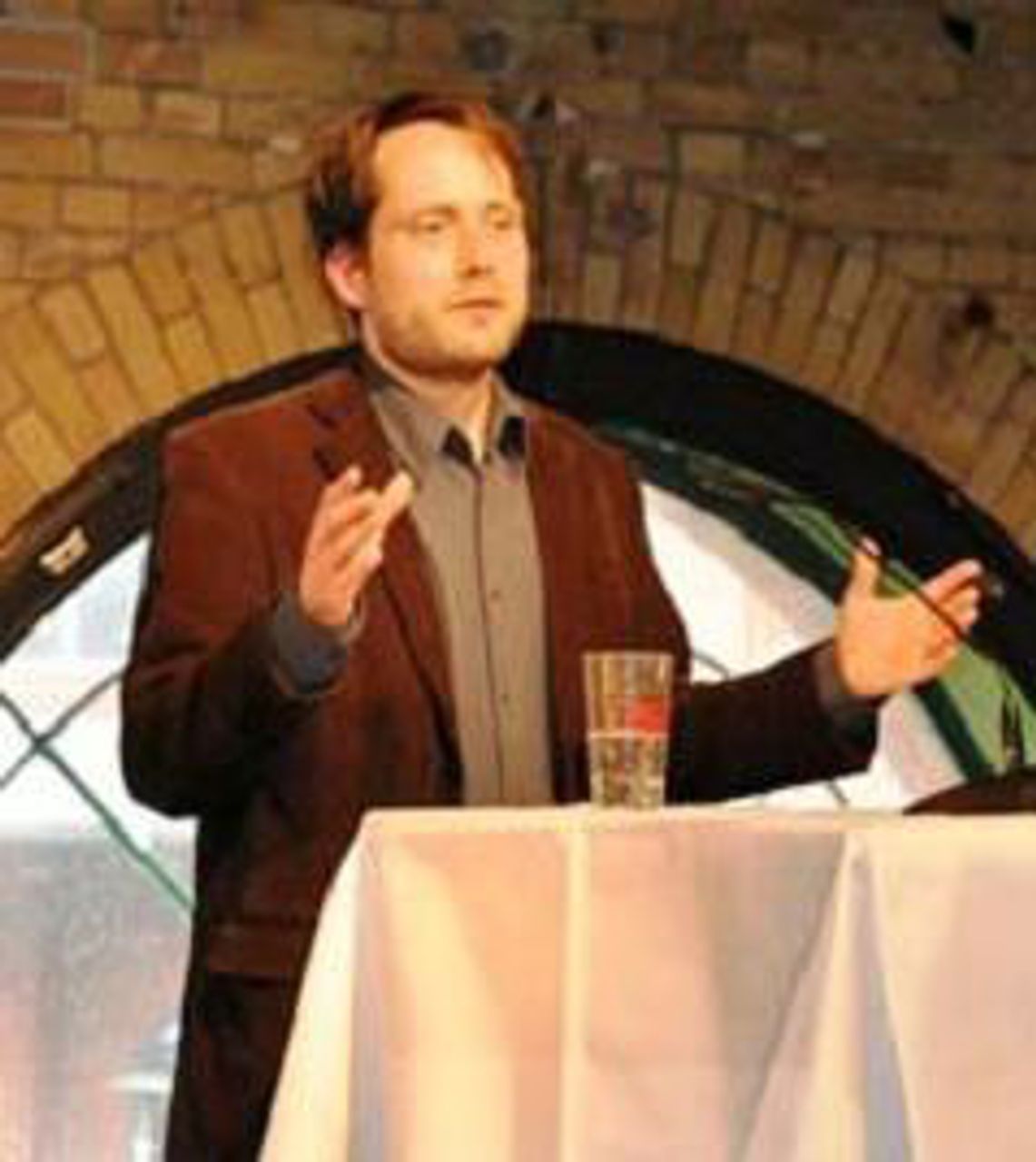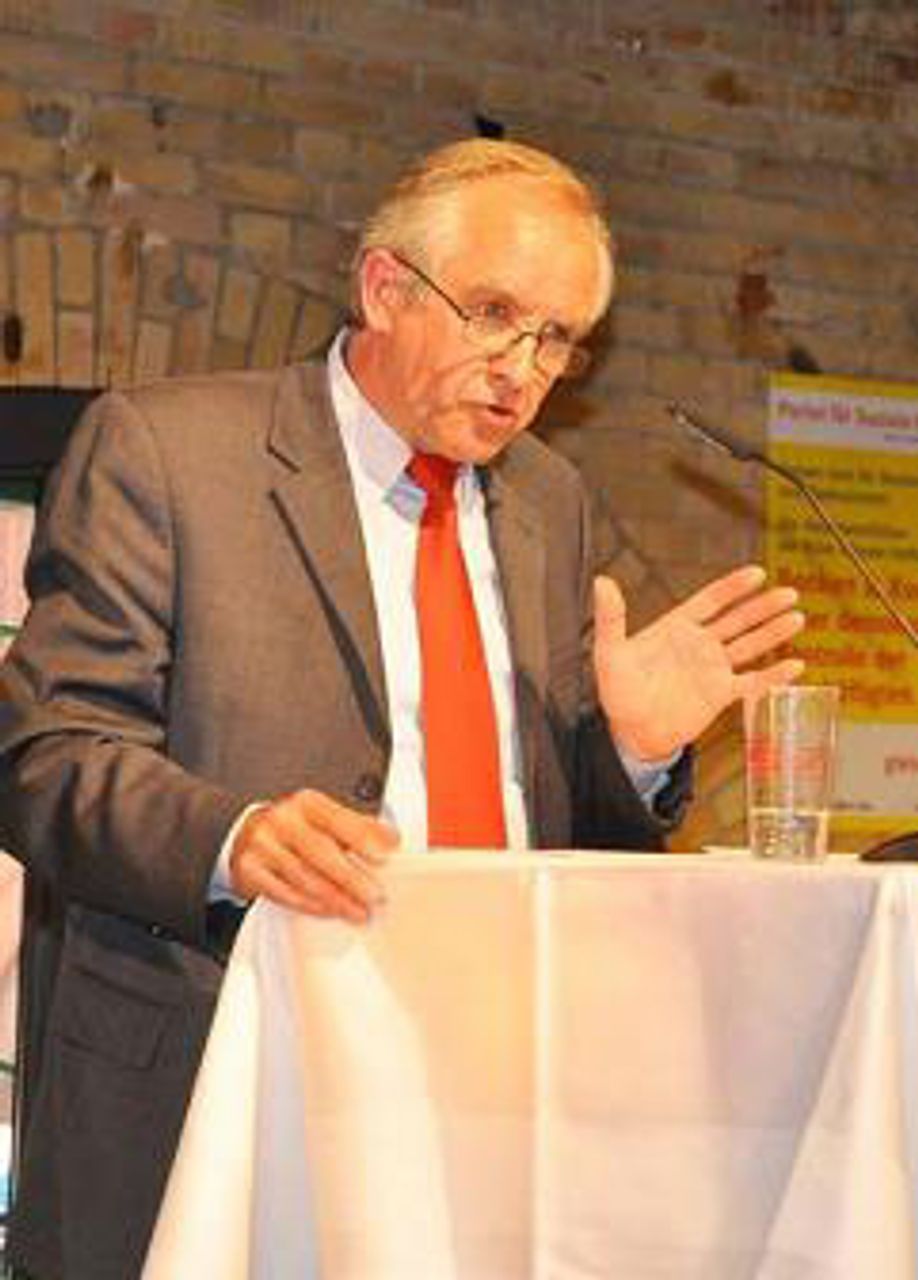 Peter Schwarz addressing the PSG election meeting in Berlin
Peter Schwarz addressing the PSG election meeting in BerlinThe “aim of our participation in the elections is the construction of a new party, which enables the working population of Europe to intervene in political events independently of the established parties. We are striving for a socialist society, which puts social needs before the profit interests of big business. As an alternative to the European Union, which is nothing less than an instrument of the big concerns and banks, we seek to unite Europe on a socialist basis.”
With this quotation from the party’s European election manifesto, Peter Schwarz—a member of the executive committee of the PSG and the international editorial board of the WSWS—opened the closing election meeting held by the Socialist Equality Party in Germany (Partei für Soziale Gleichheit, PSG).
The meeting last Saturday in Berlin was the culmination of a very successful election campaign. In recent weeks party supporters have distributed thousands of copies of the election program throughout Germany. Countless discussions were held with workers and students at universities, employment exchanges and at the public election meetings of the PSG, which were held in Berlin, Bochum, Leipzig, Frankfurt, Hamburg and for the first time in Munich.
The primary aim of the campaign was to alert workers to the real extent of the crisis and the necessity for a socialist perspective.
Addressing the meeting in Berlin, Peter Schwarz said: “The task of our program consists of saying what is; to speak to voters openly and confront them with the reality. Our program is oriented not to the past, but rather to the future. We do not promise—in the manner of the Left Party—that it is possible to return to a golden age of social reformism. Instead we prepare workers for inevitable class struggles.”
The present crisis did not come as a surprise to the International Committee of the Fourth International, Schwarz declared, because we have constantly analyzed the development of world capitalism since the end of the Second World War. After the collapse of Stalinism 20 years ago, the ICFI concluded “that the contradiction between world economy and nation states, which brought about the downfall of the Stalinist regimes, will also intensify the crisis of world capitalism.”
It then follows “that the period in which the major bureaucratic apparatuses could absorb and assimilate class divisions is over,” he said.
Schwarz continued; “For this reason we have not sought to take refuge in the Left Party or any other remnants of the old bureaucratic apparatuses. We have defended and further developed the heritage of Marxism—the revolutionary tradition embodied by Marx, Engels, Rosa Luxemburg, Lenin and Trotsky—against all those who said such a perspective had lost any meaning after the fall of the Soviet Union.”
Schwarz stressed the unleashing of revolutionary struggles by broad masses arose out of the objective situation; “Billions of people across the world are learning that the system of world capitalism is incapable of satisfying their basic human requirements. They are being forced into social confrontations in a manner they would scarcely have dreamed of in the short period previously.”
 Christoph Vandreier
Christoph VandreierChristoph Vandreier, a member of the executive committee of the PSG and candidate for the European election, explained in his contribution why the PSG had deliberately adopted a European-wide and international orientation in its election campaign. He stressed the international character of the present crisis, while pointing to the necessity and possibility of organizing joint resistance. In addition he said, it was necessary to make the experiences of the workers in individual countries accessible to the entire international working class.
Using the example of Poland, he pointed out the severe problems confronting the European working class in Eastern Europe. Poland was the origin in the 1980s, of the biggest ‘workers’ movement in Europe. In their struggle against the Stalinist regime, Polish workers established the Solidarnosc trade union, which at one point counted 10 million members. However, after the collapse of the regime, workers witnessed how it was precisely this trade union that organized the re-introduction of capitalism into Poland—organizing and creating the conditions for mass redundancies and the smashing up of social welfare systems.
The fate of the shipyard workers in Gdansk—which Vandreier had visited during the election campaign—was exemplary in this respect. In the 1980s tens of thousands had demonstrated against the Stalinists. Now, almost 30 years later, only 3,000 shipyard workers remain. In the coming months these workers anticipate that the shipyards will be totally closed and they will all be out of work.
The Polish workers fought not for the restoration of capitalism, but lacked “a socialist perspective and a Marxist analysis of Stalinism,” Vandreier said. “The perspective of political revolution was missing.”
He continued that the issue now was to confront workers with these historical lessons. They would have to turn to an internationalist perspective. That was the main task in preparing for the construction of a Polish section of the Fourth International.
Vandreier then addressed the role of the New Anti-Capitalist Party (NPA) in France, which put forward an entirely different policy. Their declared ally in Poland is the Polish Labor Party PPP. At the PPP’s recent European election congress, at which NPA leader Olivier Besancenot was a guest, delegates openly spread the most backwardness of nationalism.
Besancenot made no criticism of such nationalist sentiments, or of the glorification of Solidarnosc by PPP delegates. His own contribution to the congress made no mention of the historical or political betrayals carried out by Solidarnosc during the past three decades. At its founding conference, the NPA had eliminated any vestige of adherence to Trotskyism. Now surrounded by nationalists, Besancenot refrained from even the slightest mention of socialism.
The NPA is not a revolutionary organization, but the last line of defense for capitalism, Vandreier stressed.
K. Nesan, executive committee member of the PSG, spoke of the recent events in Sri Lanka.
“For the working population of the country, the end of the war against the LTTE is no reason to celebrate. It does not solve any of their immediate problems and the government is preparing fresh attacks on democratic rights and living standards,” he said.
The speaker reported on the thousands of civilian casualties and the 300,000 refugees, whose living conditions are described by experienced relief organizations, as the worst they have ever seen.
K. Nesan pointed out that the costs of both the war and the international economic crisis will be paid by the working class, in order to protect the state of Sri Lanka from impending bankruptcy.
He described the manner in which Sri Lanka was being used as the battleground for the increasing conflicts between the international great powers. While Great Britain and France are demanding an investigation of war crimes in Sri Lanka, China, Russia and India have rejected such an investigation as interference into the internal affairs of Sri Lanka.
The most important lesson to be drawn from the developments in Sri Lanka however is the bankruptcy of the perspective pursued by the Tamil liberation organization, the LTTE.
“The Sri Lankan army was militarily superior to the LTTE in all respects. In the final stage of the war it organized a cold-blooded massacre of hundreds of fighters. The real cause of the defeat, however, is to be found in the narrow-minded, ethnically oriented perspective of the LTTE.”
The foundation for this perspective was the social orientation of the LTTE. “Although the LTTE paid lip-service to socialism in its initial publications, it represented historically, the interests of the Tamil elite which demanded the right to exploit their own people.”
The hostility of the LTTE to the working class was shown above all in 1998, following the abduction of members of the Socialist Equality Party in Sri Lanka, who were set free only after an international campaign waged by the World Socialist Web Site.
K. Nesan summarized the experiences of the 26-year-long war in Sri Lanka and the policy of the LTTE as follows; “The defeat of the LTTE does not invalidate the democratic demands of the Tamil minority. It makes clear, however, that such democratic rights can only be won through a socialist revolution, which is based on an internationalist program.”
 Ulrich Rippert
Ulrich RippertThe final speaker at the rally was Ulrich Rippert, the chairman of the PSG and its leading European election candidate. His contribution was dedicated to the question; “Why is the construction of a new socialist party necessary, and why is the PSG this new party?”
To understand this question, it is necessary, Rippert stressed, to analyze the social and political consequences of the present economic collapse as concretely as possible and study the history of the socialist movement.
Rippert enumerated a number of consequences of the crisis, such as the 12 percent decline in production and the 16 percent drop in trade in the past half year, as well as the rise of unemployment worldwide to 190 million. He continued: “The crisis is not an aberration, not a malfunction in an otherwise effective and workable capitalist system, but is rather the inevitable result of the historical decline of this system.”
This crisis has “deep objective causes in the contradictions of capitalism,” he stressed. “In particular, it is the contradiction between social production bound up with an international division of labor, and private appropriation, which is inseparably connected to the nation state.”
The class struggle is based on these objective social tensions. Rippert recalled the way in which a succession of governments, have literally turned over state treasuries to the banks in the form of various rescue packages. At the same time, mass unemployment is being used to implement wage cuts across the globe and undermine welfare state provisions.
There could be no doubt that these attacks would provoke a reaction and resistance from the working class. The apparent calmness within the working class should not give cause for pessimistic conclusions. It is “the calm before the storm,” he said.
It was necessary to use this time in order to create “the political instrument which can steer the coming social explosion in a progressive, socialist direction.”
Rippert called upon those present to learn from the experiences of the workers’ movement in the 20th century; “Especially in Germany, where the working class has already built two mass parties in the form of the SPD and KPD, it is crucially important to draw the lessons from the rise and fall of these two organizations.”
Finally the speaker described the main points of the program of the PSG; internationalism, the struggle for the socialist transformation of the society and the fight for the political independence of the working class.
This program requires the PSG in its election campaign to “very consciously oppose the Left Party and other groupings, which describe themselves as “anti-capitalist lefts.”
Rippert explained the social function of these leftist parties and groupings as follows: “The Left Party in Germany, Mélenchons formation in France, Communist Refoundation in Italy, Syriza in Greece, as well as the NPA in France are political initiatives of the ruling classes and part of their preparation for imminent class struggles.”
The bourgeoisie is quite conscious that the economic and social crisis will lead to revolutionary struggles, which will by far exceed the intensity of the youth protests in Greece at the end of last year. It is preparing in two ways—“At the same time as it limits democratic rights by increasing state and police monitoring in all countries and encourages nationalist and racist tendencies—the ruling class also nurtures leftist parties, which call themselves socialist or anti-capitalist and in cooperation the trade unions head off revolutionary protests that could threaten the bourgeois order.”
In his concluding remarks, Rippert explained that the globalization of production had stripped away the basis for any nationally based perspective. “This is what is behind the breakdown of the entire old workers’ movement. In addition, globalization introduced a qualitatively new stage of social development in which the working class will learn to act as an international class in order to develop a new, modern, society based on solidarity. Our confidence and our optimism are based on this objective development.”
During the meeting, messages of greeting were read out from Great Britain, France and Turkey.
At the end of the meeting, a collection raised over €4,000 for the PSG campaign fund.
Around 100 participants followed the speakers’ contributions with close concentration. The meeting demonstrated that the PSG campaign has found a significant response among an important layer of workers and young people.
